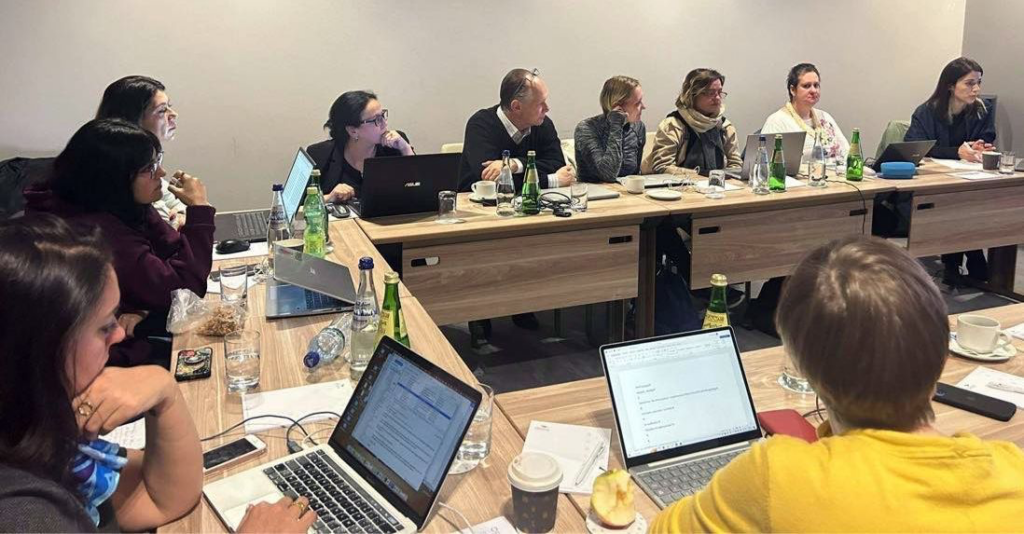Written by Co-WG3 Leader Lela Goginava (Center for Migration and Diaspora Studies, East European University of Georgia) & Lívia Prosinger (Institute of Political History, Budapest, Hungary)
On October 13-14, 2024, the Transcribathon took place in beautiful Georgia, spanning two different locations. The first day was hosted by East European University, followed by a meeting at the Glarros Oldtown Hotel on the second day. Participants from our network, representing Bulgaria, Canada, France, Finland, Georgia, Iceland, Ireland, Macedonia, Poland, Turkey, and Ukraine, collaborated on various deliverables over the course of the two-day event.

The Transcribathon featured two keynote presentations by esteemed speakers. On October 13 Lela Goginava, Co-leader of WG3 and Director of the Center for Migration and Diaspora Studies (EEU), delivered a presentation titled « Women from Georgian Political Emigration and Their Activities in Exile ». In her presentation, she explored the role of Georgian women and their impact on various fields, including politics, culture, and education, as evidence of their resilience and determination. Georgian political emigrants were individuals who fled their homeland due to political persecution. After the Red Army invasion of Georgia in 1921 and the surrender of the first government of Georgia, many government leaders, their family members, and supporters faced a range of fates, including exile, imprisonment, and execution. Georgian women played a significant role in Georgian political emigration. They were active participants in the struggle for independence, and many of them held leadership positions in various countries. Despite facing challenges, they persevered and made significant contributions to their communities. They were intellectuals, artists, and politicians who sought refuge in various countries, including France, Germany, Switzerland, Belgium, Peru, and others. Their exile lasted for several decades, during which they continued to fight for the independence of Georgia.

On 14 October Mary (Meko) Chachava, a representative of the Embassy of Japan in Georgia and a researcher in development issues, presented on « Socio-economic Stability for Georgian Labor Migrant Women ». During her insightful presentation, Mekoshed light on critical aspects of migration in Georgia. She emphasized that while the country has taken significant strides in developing migration systems, the feminization of migration often remains overlooked. There are notable gaps in legislation, policy, and programs that pose obstacles to the return and sustainable reintegration of migrant women. The experiences shared by labor migrant and return labor migrant women underscored the profound impact of migration experiences, the socioeconomic landscape of the country, and the availability of return and reintegration assistance. Unfortunately, these aspects, along with other sectoral legislation, policy, and programs, lack a gender perspective.

In addition to the keynote speakers, the other backbone of the two-day meeting were the Transcribathons, during which the deliverables of our working groups were expanded thanks to the joint work. On 13 October, the first Transcribathon was held to search for new landmarks and create new biocards to the Register of Women Migrants’ Landmarks to further expand the unique interactive map of Working Group 2. The afternoon Transcibathon was dedicated to expanding and enriching the Catalog and Repository of Primary Sources maintained by Working Group 1, whose main objective is to locate historical documents and primary sources. Explore the map to discover European archives and libraries with primary sources on women’s migration! On 14 October, the first Transcribathon focused on expanding the datasets created by Working Group 3. The datasets on women migrants’ resources help us to improve our understanding of women’s economic role in migration contexts in contemporary and past societies. During the Transcribathon, which closed the second day of the meeting in Georgia, we looked for milestones that could help to create a timeline on women’s migration across Europe using the key moments involved in women’s migration in Europe between 1600 and 2020.

Throughout the event, participants had the opportunity to visit the Writers’ House, where they were introduced to the invaluable heritage preserved by the Writers’ House, encompassing both material and spiritual culture. During our recent visit to the House of Writers, we were reminded of the invaluable contributions made by the Wardrop siblings to Georgia, especially Marjorie Wardrop, whose linguistic talents extended to Russian, Romanian, and Georgian, with her translations of ancient Georgian prayers and chants housed in the Bodley Library. Marjorie meticulously studied Georgian texts with renowned scholars like Maggio and Marie Brosset, with her first foray into Georgian literature being the Gospels. Her contribution to the translation and popularization of Georgian literature is invaluable. Additionally, a walking tour of the city provided further enrichment to the event.
